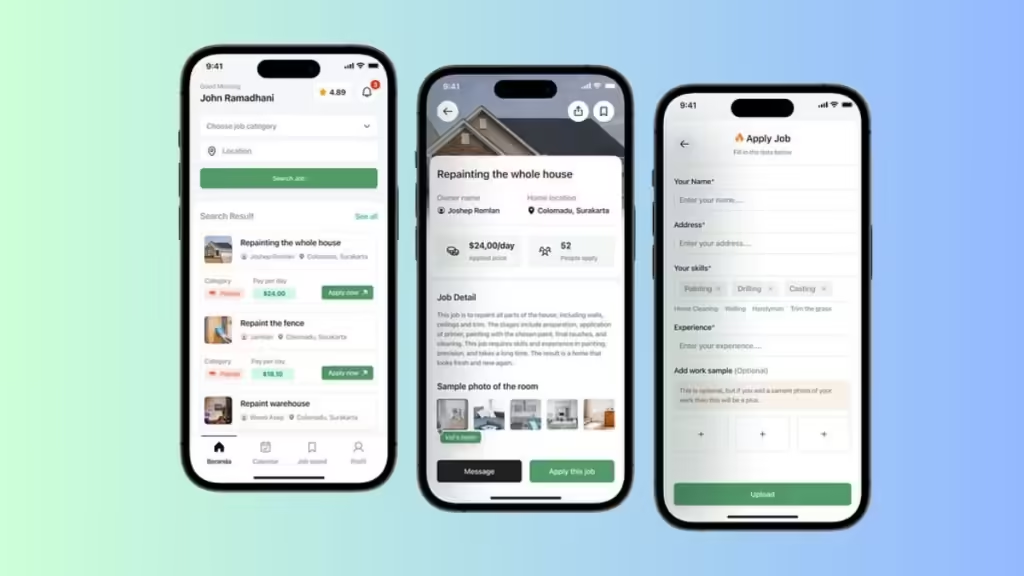An UrbanClap clone app allows home service professionals like plumbers, electricians, beauty professionals etc. to list themselves on an online marketplace where customers can discover and book their services. By building such a platform, home service businesses can effectively reach more customers, manage bookings and payments digitally, get reviews and insights to improve – ultimately increasing their profits.
In this blog, we will comprehensively discuss how home service businesses can leverage an UrbanClap clone app to gain new customers, streamline operations and boost revenues. We will cover topics like setting up the professionals’ directory, designing the booking system, developing a responsive mobile app, listing service offerings, enabling reviews, handling payments, providing search and discovery tools, engaging users, implementing customer support and using business analytics.
Build a Professionals Directory
The first step is to onboard home service professionals onto the platform. Businesses need to create a user-friendly registration process for professionals to sign up. The registration form should collect key details like business name, contact information, service area, qualifications/licenses etc.
It’s important to verify all professional listings to ensure quality. Businesses can conduct background checks of license/credential details provided during sign up. Optionally, an in-person identity and skills verification can also be done. This builds trust for customers.
Professionals also need to submit documents like ID proof, qualification certificates, license/registration copies, photos, samples of previous work – basically everything required to assess their credibility. Fitness tests related to their domain of work can be conducted as well. Only qualified professionals meeting the set standards should be approved.
The verified professionals then need to be provided with a profile page on the platform. This acts as their digital presence where they can add more details, photos/videos of work and interact with customers. A recognizable badge can also be given to verified professionals for added credibility. This directory forms the foundation of bringing professionals and customers together.
Create a User-Friendly Booking System
An efficient and user-friendly online booking system is key to providing a seamless experience for customers as well as professionals. First, customers need to easily search and filter through available professionals as per their location, service category and other preferences.
The booking page for each professional must clearly show their real-time availability calendar. Customers should be able to instantly book available slots by selecting the service, preferred date and time. All service request details like address, contact details, service type/package and any special instructions can be captured.
Some useful features include recurring/subscription bookings, bulk booking for communities/builders and provisional bookings that are confirmed later based on professional’s schedule. Integrations with payment gateways allow customers to pay deposits or full amount during the booking process itself for seamless reservations.
Professionals should also be able to login to a dashboard that displays incoming service requests, their schedules and manage entire workflows efficiently. They can seamlessly sync availability calendars with the platform, accept/reject bookings and get reminders. This helps streamline operations and serve customers better.
Develop a Responsive Mobile App
A responsive mobile app is essential to provide an optimized user experience for customers and professionals – especially as more users are mobile-first. The app should allow customers to easily search, view profiles, read reviews, check schedules, book and pay for services – all from their smartphones.
Some key features for a professional booking mobile app include:
- Push notifications for new booking requests and reminders
- On-the-go scheduling and calendar management
- Service status updates and tracking
- Customer communication and chat
- Issue/complaint redressal on the field
- Offline support for no internet areas
- In-app payments and wallet
- Service history, ratings and analytics
The app ensures professionals remain reachable and can efficiently manage their entire business from anywhere. Similarly, customers get 24/7 access to book trusted home services at their fingertips. A responsive mobile-first approach is a must for such a marketplace. Learn more: https://zipprr.com/urbanclap-clone/
List Services and Pricing Options
detailed and customized service listings form the backbone of any marketplace. Businesses should guide professionals to clearly specify the types of services offered along with descriptive details, important inclusions, photos/videos showing process if possible.
Standardized category-wise services make it easier for customers to compare options. Pricing models can include per job fixed costing as well as hourly/package based subscriptions depending on the nature of work. It’s also good to keep standard packages for generic requirements.
Some additional monetization ideas are bundled/subscription plans for regular services like monthly pest control or quarterly AC servicing. volume/community based discounts can attract larger housing societies/builders. Trial packages for new customers can also boost conversions. All these provide flexible options while also improving pricing transparency.
High quality and consistent service listings with well defined inclusions and pricing go a long way in managing customer expectations and gaining their trust in the platform’s capabilities and professionals’ expertise. Repeat/loyal customers are the biggest growth opportunity.
Enable Reviews and Ratings
Customer reviews and ratings are extremely important in establishing credibility for professionals and the platform. A robust review system needs to be put in place right from the beginning.
Only customers who have booked and used a particular professional’s services should be able to leave a review. A rating on parameters like Punctuality, Quality, Value, Communication etc. allows both quantitative and qualitative assessment. Review text should have a reasonable character limit for elaborating the experience.
It’s wise to allow two-way interaction where professionals can also politely respond to reviews. This shows their commitment to transparency and service improvement. All reviews especially negative ones must be moderated to check for fake, biased or offensive content before publishing.
Accumulated ratings are then used to generate an overall score for each professional. This rating becomes the primary benchmark for customers to quickly assess quality. Top professionals can also be featured or rewarded through a recognition/badging system on the platform based on consistently good reviews.
Regularly published ‘Hall of Fame’ lists highlight best professionals as recommended by real customers. Transparency drives credibility which is core for any marketplace business like this.
Manage Payments
To provide a seamless user experience, it is necessary to support integrated payment options both on the website and mobile app. Main options to consider include debit/credit cards, net banking, UPI, wallets and even cash for certain markets.
The booking workflow itself should be designed to collect applicable payments at the time of reservation. Upfront deposits, full payments can be collected depending on the business model and service type. Customers find it more convenient this way compared to separate payment steps.
For recurring/subscription services, a dashboard allows adding and managing multiple payment modes securely. Online payment gateways are used to ensure safety of financial data during transactions by following industry protocols. Users should also have the option to save preferred modes for one-click future payments.
On the professional’s end, their payment settlement can be automated based on pre-defined schedules like weekly, fortnightly after payment collection from customers to provide cash flow. Transaction failures and delayed/failed payments also need special handling policies.
Ensuring seamless, convenient and secure payments is a major factor in customers’ adoption and retention for any service marketplace.
Offer Discovery and Search Tools
Great discovery and search features ensure professionals matching customers’ requirements can be found easily. The first level of filters should allow filtering by location, category/sub-category of service. Customers can manually enter or use their current location via browser/app.
Advanced filters like keyword search, ratings, language, certifications, services/amenities increases accuracy. Customers must also be able to clearly view professionals’ service areas on an interactive map view. Questions/ Enquiries related FAQs help customers find right solutions.
Geofencing within a certain radius of user’s location provides local results. Notifications when new professionals sign-up in their area triggers discovery. Customized recommendations based on past searches, booked professionals and similar customer profiles come handy.
Well-designed home page Spotlights featuring top rated professionals promoting their unique offerings change impression for customers. Success stories and testimonials and build trust while customer questions answers provide credibility and aid decision making in selection.
These discovery features ensure right professionals are matched to customers needs with minimum effort, driving higher conversions.
Engage with Customers and Professionals
Active communication and engagement is necessary to build an engaged community on the platform. Businesses must collect consumer profiles and preferences to serve relevant and personalized communication.
For customers – Educational emails, push notifications for new deals, community forums for discussions and periodic surveys collects feedback. Professionals can participate in forums too.
Professionals get informative newsletters, training updates, new feature notifications and performance metrics for self-evaluation. One-on-one mentoring assists their business growth. Communities allows peer-learning, best practices sharing and networking.
Reward programs and virtual/physical events fosters healthy competition among professionals maintaining service standards. Holistic engagement in on-boarding to post-service boosts retention.
Focus on Customer Support
Excellent and accessible customer support builds lasting trust and credibility for any service marketplace. An efficient support system should be able to quickly address all user related issues and complaints.
Ideally support channels like phone hotlines, email ticketing, app/website based live chat facilities must be provided. Customers must be able to reach out for help within minutes of facing any issues. The aim should be resolving most queries during first contact itself.
As mentioned, it is important to have multiple support channels like phone, email and live chat available for customers. An online ticketing portal makes it easy for customers to raise issues by selecting relevant topic/category. The status of tickets should be updated automatically as per SLAs.
Priorities and automatic escalations based on ticket criticality ensures no complaints are left unattended. For recurring issues, proactive callback services are effective. Customers should also be surveyed post-issue resolution to gauge satisfaction. Ongoing monitoring and analysis of support tickets provides insights into improving areas.
Customer support agents need to be trained rigorously on product and policy details to handle complex scenarios efficiently. First call resolutions should be the target through polite andempathetic communication. Query response times must be within committed timelines to meet customer expectations.
Implement Analytical Tools
Advanced analytics and business intelligence tools help businesses optimize platform performance, measure ROI of strategies and guide future roadmap. Advanced setup requires integrations that can extract meaningful data security.
Key aspects to measure include – Growth of professionals & customers over time, Daily/weekly booking volumes, Service/rating trends, Popular locations/lists, Busiest days/times etc. This allows demand forecasting and optimizing professional allocation.
Customer profiling based on location, services used, time intervals between bookings offers cross-sell opportunities. Funnel analysis from sign-ups to trials to paying customers helps optimizing conversion rates. Drop-off analysis helps removal pain-points.
Return on AdSpend, promotion campaigns and discounts are quantifiable. Querying such data on demand supports decision making. Advanced AI/ML can even automate such analysis and provide prescriptive guidance.
Access to such real-time insights enable constant augmentation towards business goals.
Conclusion
In summary, leveraging a well-planned UrbanClap clone solution can help home services businesses scale to new regions, avail digital reach and boost profits through a marketplace business model. Onboarding professionals, designing an efficient booking workflow, developing a mobile app, enabling comprehensive service listings along with reviews/feedback and payments are core elements of such a model.
Proactive user engagement, accessible customer support and leveraging analytical tools for optimization ensures a delightful and trusted user experience. This formula of bringing homeowners and pre-vetted local professionals together through advanced technology increases customer acquisition, improves management operations and unlocks unlimited growth opportunities for home service providers across categories.
An established platform also adds an intangible ‘brand credibility’ benefit for individual merchants to draw upon. Entrepreneurs should seriously evaluate this digital transformation for home services through a fully integrated community driven marketplace clone app for long term sustainable growth.



